Morocco—the name itself evokes a sense of magic. It conjures images of bustling, aromatic souks in Marrakech, the ancient medieval tanneries of Fes, the vast, silent beauty of the Sahara Desert, and the breathtaking Hassan II Mosque in Casablanca, standing watch over the Atlantic.
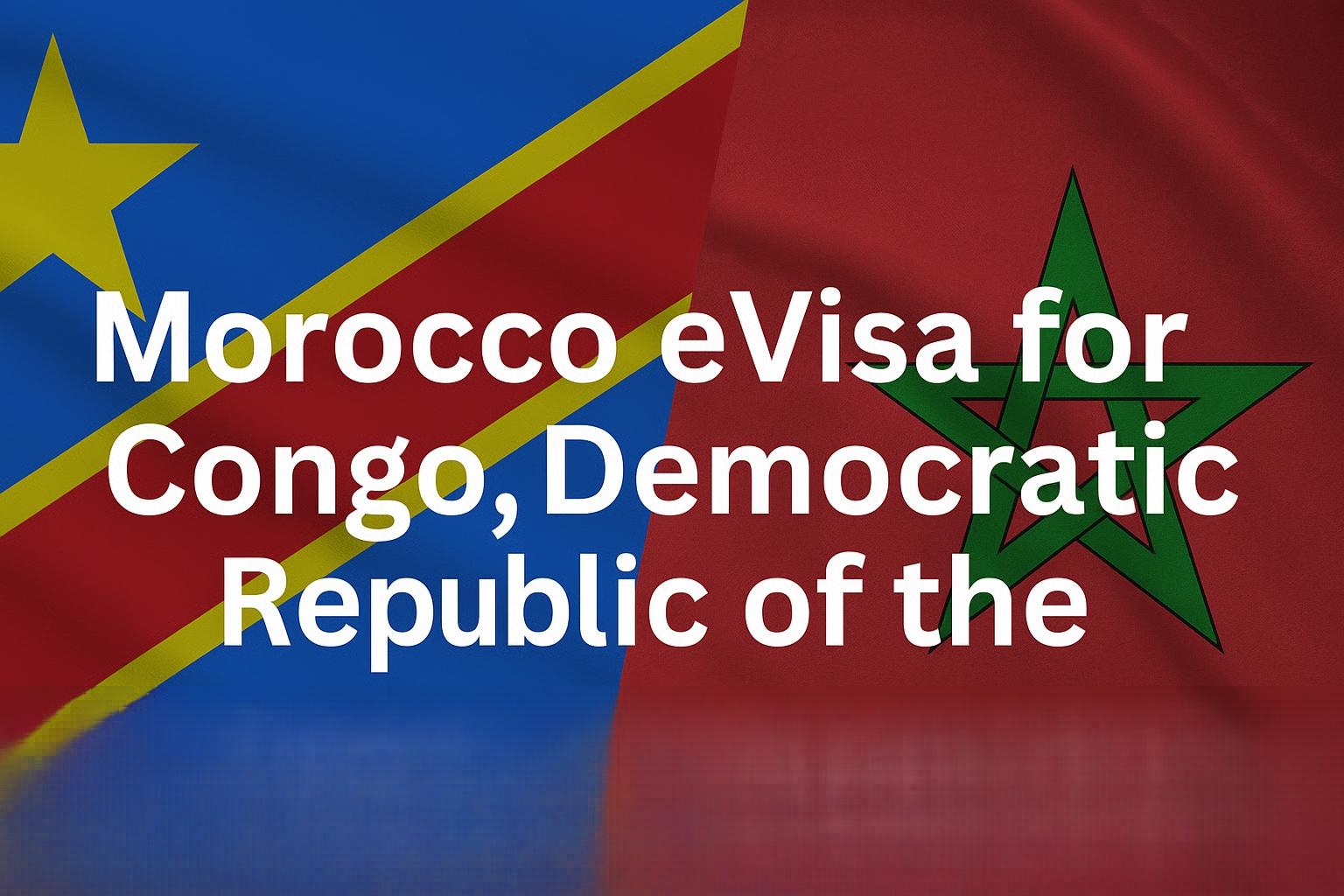
For citizens of the Democratic Republic of the Congo (DRC), the desire to explore this iconic North African kingdom is strong. But before you can book that riad or plan your camel trek, there is the critical, and often confusing, question of the visa.
You've probably heard about Morocco's new, "easy" e-Visa system, which promises a 100% online application. This is fantastic news, but it has created a major point of confusion for Morocco eVisa from Congo (DRC) travelers.
Here is the most important fact you need to know: the Morocco e-Visa is conditional. It is not open to all DRC passport holders.
Do DRC Citizens Need a Visa for Morocco?
Yes, absolutely. A citizen of the Democratic Republic of the Congo cannot enter Morocco visa-free for tourism or business. A valid visa is mandatory.
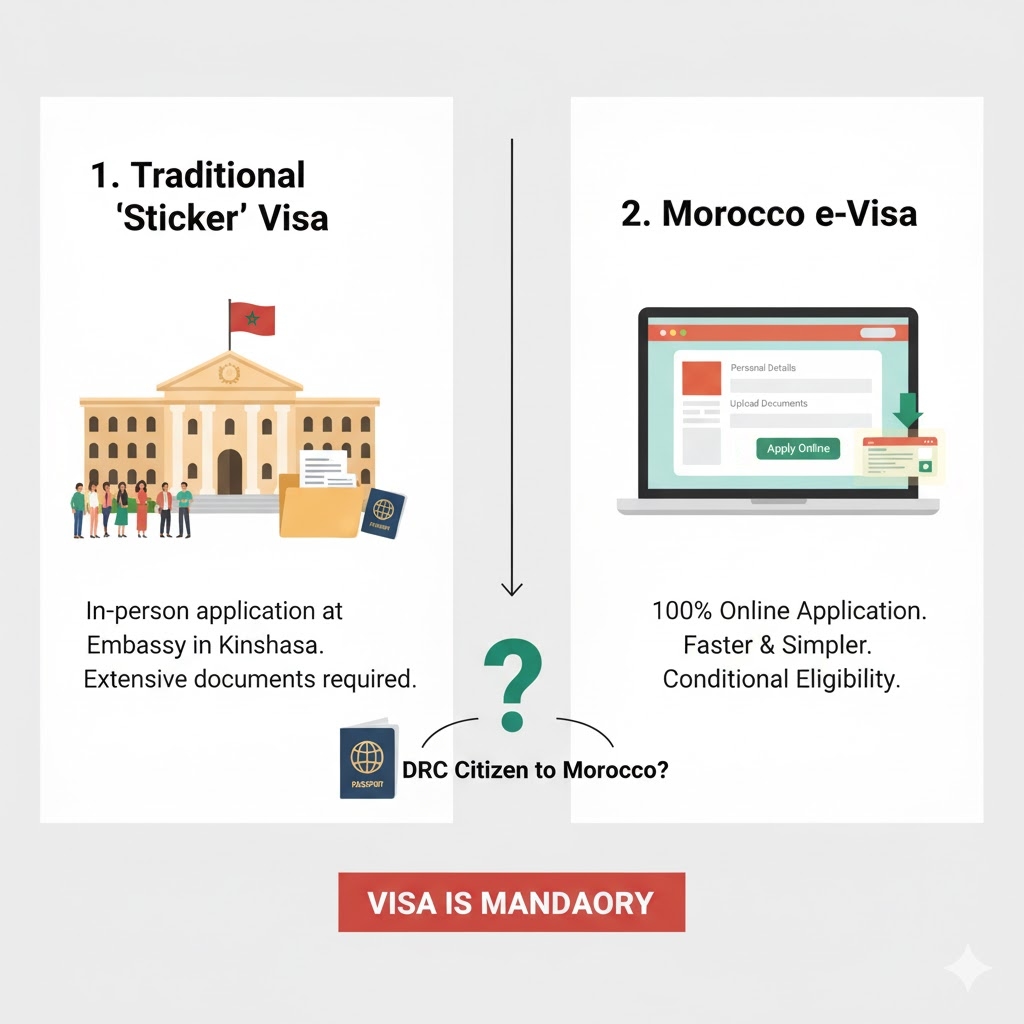
The good news is that you now have two potential pathways to get one:
The Traditional "Sticker" Visa: This is the standard application process. It requires you to compile a detailed file of documents and apply in person at the Embassy of the Kingdom of Morocco in Kinshasa. This option is available to all DRC citizens.
The Morocco e-Visa: This is the new, 100% online application. It is faster, simpler, and removes the need to visit the embassy. However, it is a conditional visa with a very specific eligibility rule.
This guide will focus on the e-Visa, as it's the most common source of questions.
Who is Eligible for Moroccan visa requirements from Congolese (DRC) citizens?
The Democratic Republic of the Congo is on Morocco's "List B" (or "Category B") of countries. This means a DRC passport alone does not make you eligible for the e-Visa.
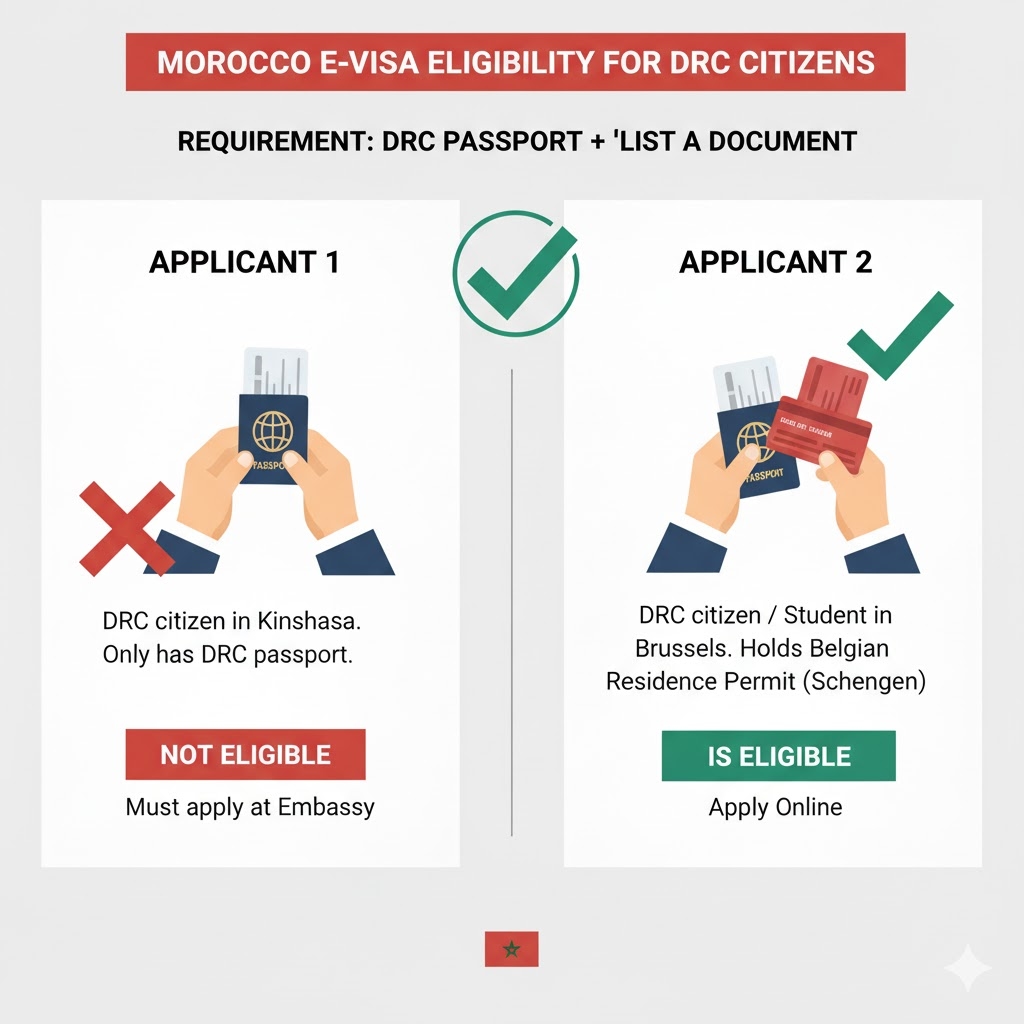
You are ONLY eligible to apply for Morocco e-Visa if you also hold one of the following "List A" documents:
A valid Residence Permit from:
The United States (USA)
The United Kingdom (UK)
The Schengen Area (e.g., France, Belgium, Germany, Spain)
Australia
Canada
Japan
New Zealand
Ireland
A valid multiple-entry Visa from one of those same countries.
Let's use two clear examples to illustrate:
Applicant 1: A DRC citizen living in Kinshasa. Their only travel document is their valid DRC passport.
Result: NOT ELIGIBLE for the e-Visa. Their application will be refused, and the fee is non-refundable. They must apply at the embassy in Kinshasa.
Applicant 2: A DRC citizen who is a student in Brussels and holds a valid Belgian residence permit (which is a Schengen document).
Result: IS ELIGIBLE for the e-Visa. They will use their Belgian residence permit as their "Supporting Document" in the online application.
Before you even start an application, you must confirm you have one of these qualifying documents.
What if I'm Not Eligible? (The Embassy in Kinshasa Route)
If you are like "Applicant 1" and do not have one of the "List A" documents, you cannot use the online system.
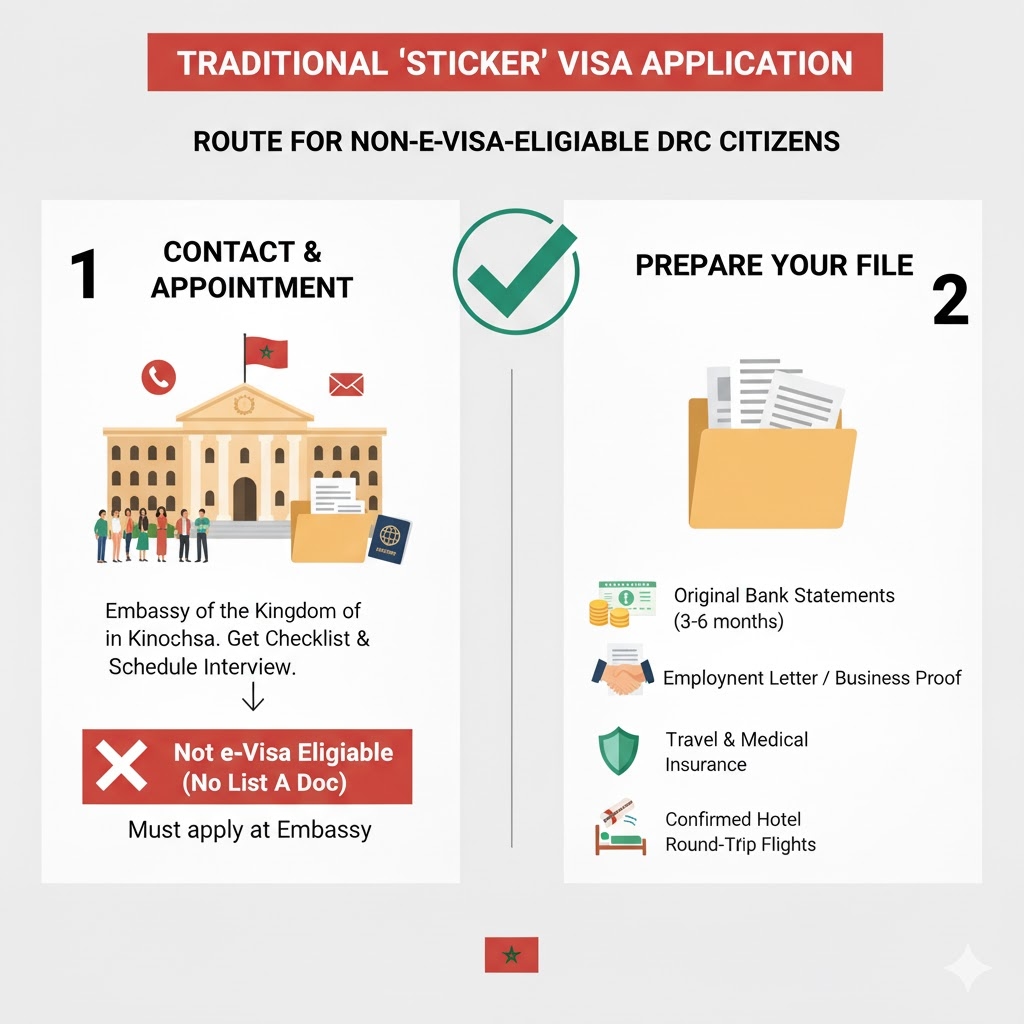
Your only path is the traditional "sticker" visa. You must contact the Embassy of the Kingdom of Morocco in Kinshasa to get their most up-to-date application checklist and to schedule an appointment.
This process is different and more in-depth. You will typically be required to provide a full file of original documents, such as:
Original bank statements for the last 3-6 months.
A letter of employment or proof of your business.
Travel and medical insurance.
Confirmed hotel reservations for your entire stay.
A confirmed round-trip flight booking.
How to Apply for Moroccan visa from Congolese (DRC) citizens?
If you've confirmed you are eligible (you have a DRC passport + a valid US/UK/Schengen visa or permit), here is how to apply:
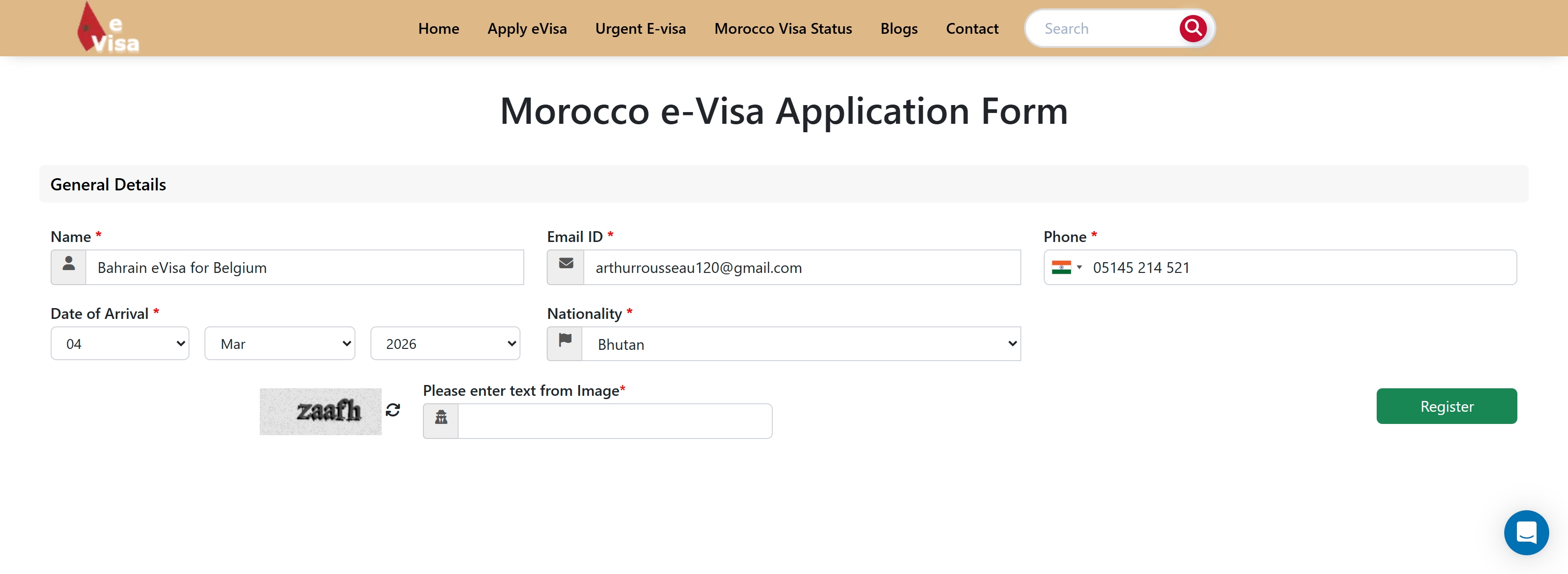
Start Your Application: Fill in the online form with your personal details, DRC passport information, and contact info.
Select Your Visa Type: The Moroccan visa will give you a choice. The standard options are:
"Tourist eVisa - 180 days, Single entry"
"Business eVisa - 180 Days, Single entry"
Upload Your Documents: You will be prompted to upload digital copies of your documents (more on this below).
Review and Declare: This is a crucial step. You must review all your information and check several declaration boxes (which we will cover in detail).
Pay the e-Visa Fee: Pay the non-refundable processing fee online using a Visa or Mastercard.
Submit and Wait: After payment, your application is submitted for review. The processing time you selected begins now. You will receive a confirmation email.
Print Your e-Visa: Once approved, you will receive a PDF of your e-Visa. You must print this document to travel.
What Documents Do I Need to Upload for Moroccan visa from Congolese (DRC) Passport holder?
The application will have clear upload fields for:
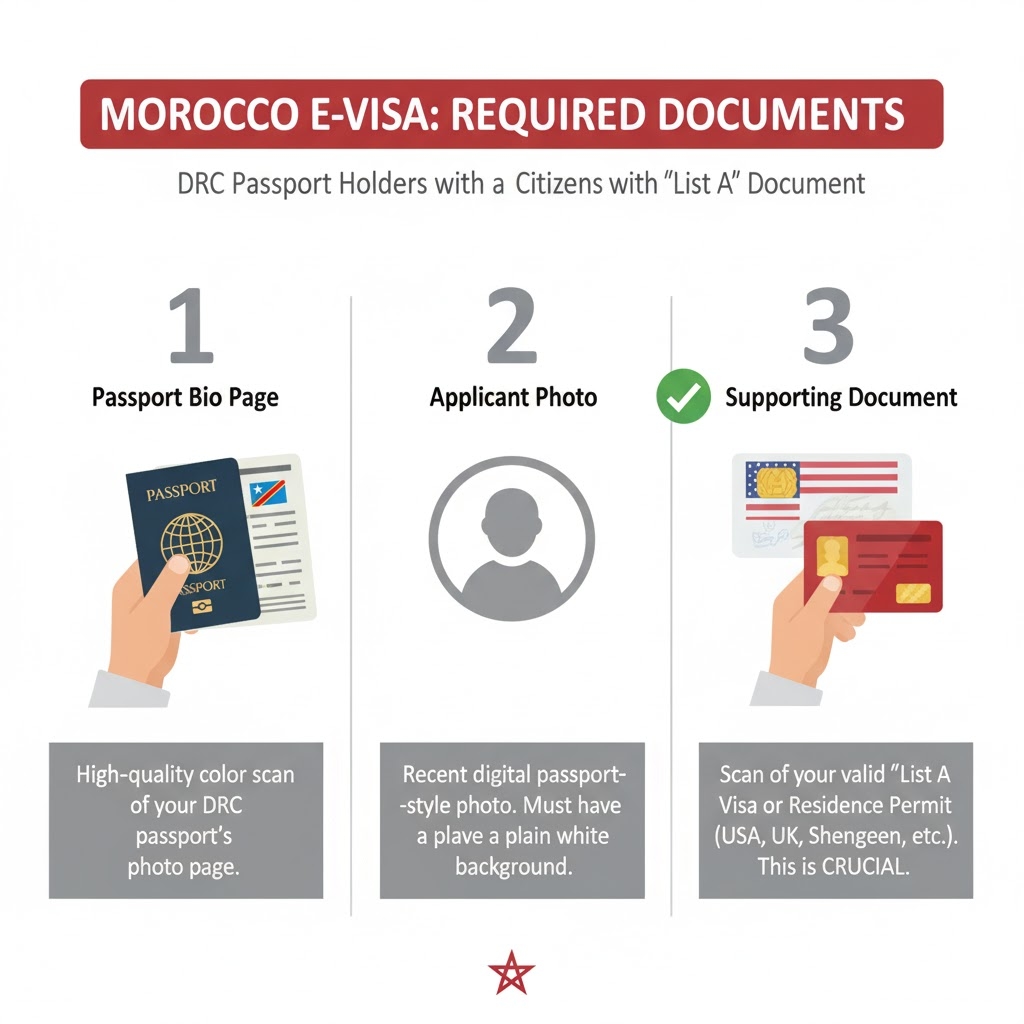
Passport Bio Page: A clear, high-quality color scan of your DRC passport's information page (the one with your photo).
Applicant Photo: A recent, digital passport-style photograph of yourself (must be on a plain white background).
Supporting Doc - Valid Multiple-Entry Visa: This is the most important upload. This is where you upload the scan of your valid US, UK, Schengen, or other "List A" visa or residence permit.
What is the "Type of Supporting Doc."?
On the form, you will be asked to select the "Type of Supporting Doc." Your main options will be:
Visa
Residence Permit
You must choose the one that applies to you (e.g., if you have a US B1/B2 visa, you choose "Visa"; if you have a French resident card, you choose "Residence Permit").
90-Day Moroccan visa Validity Rule: The #1 Application Mistake
The application explicitly states your supporting document "must be valid for more than 90 days."
This is a strict technical rule that causes many refusals. It means that on the day you submit your e-Visa application, your supporting US visa, Schengen visa, or UK residence permit must have at least 90 days of validity remaining before it expires.
If your supporting US visa expires in 60 days, your e-Visa application will be automatically refused, and your fee will not be refunded.
Moroccan visa Final Declarations (What Are You Agreeing To?)
Before you pay, you must check several boxes. These are legal declarations. You are certifying that:
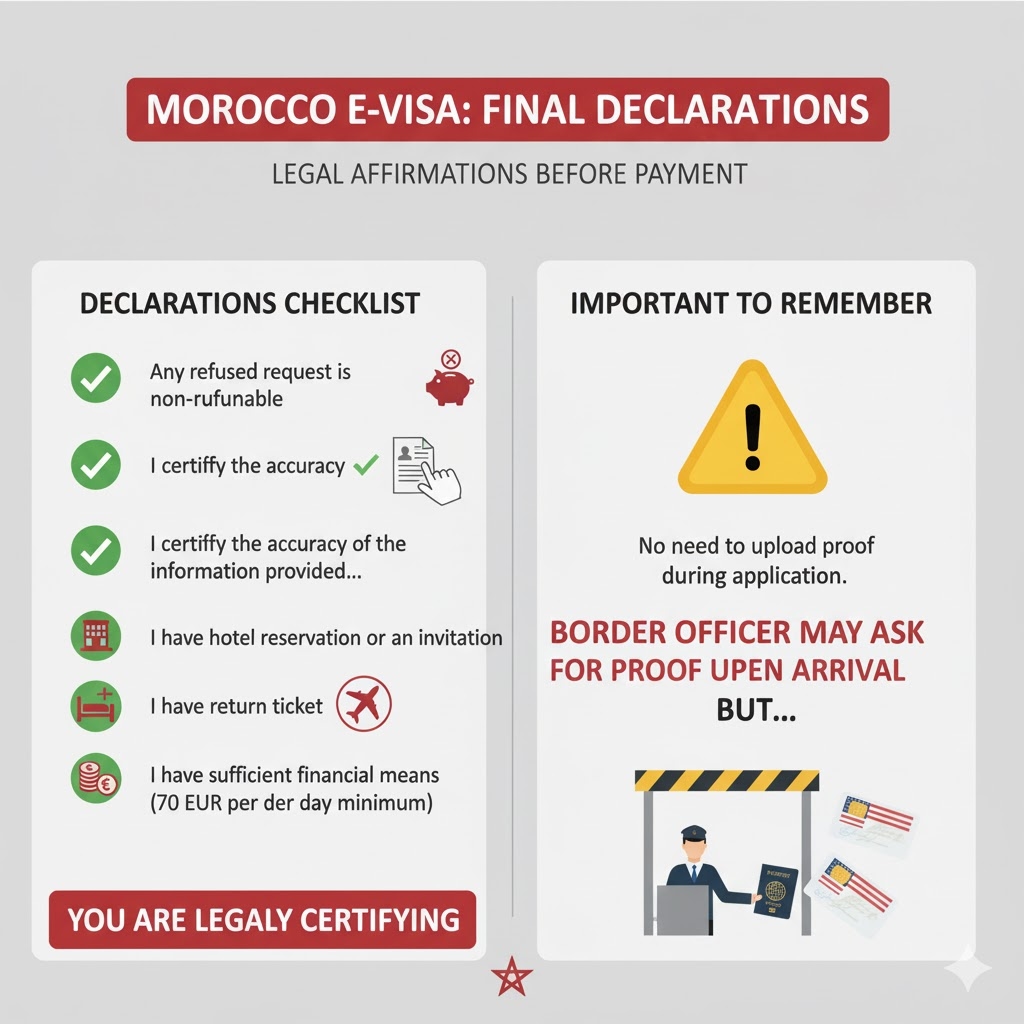
"Any refused request is non-refundable": You acknowledge that if you are refused (even for a simple typo), you will not get your money back.
"I certify the accuracy of the information provided...": You confirm that all your info is 100% correct. A typo will lead to a refusal.
"I have hotel reservation or an invitation"
"I have return ticket"
"I have sufficient financial means (70 EUR per day minimum)"
You do not have to upload proof of these last three items for the e-Visa application. However, you are legally declaring that you have them. A Moroccan border officer has the right to ask you for this proof upon arrival.
What is the Moroccan visa Processing Time?
The Moroccan visa lets you choose your processing speed for an additional cost:
Normal Processing: 3 to 6 business days
Rush Processing: 2 to 4 business days
Super Rush Processing: 1 to 2 business days
My advice: Don't pay extra unless it's a true emergency. Apply with "Normal Processing" at least 2-3 weeks before your trip to save money and avoid stress.
How Long Can I Really Stay with a Moroccan visa?
This is a final point of confusion. The visa type says "180 days, Single entry." This does not mean you can stay for 180 days.
Entry Window: You have 180 days (6 months) from the date the e-Visa is issued to enter Morocco.
Duration of Stay: Once you enter, you can only stay for a maximum of 30 days.
Single Entry: It is a Single Entry visa. If you leave Morocco (even for a day trip to Spain), your visa is used, and you cannot re-enter.
What to Do With Your 30-Day Moroccan visa: A Family-Friendly Guide
While your e-Visa is valid for 30 days, you can see a lot! If you are traveling with children, Morocco is magical. Here are some top kid-friendly activities:
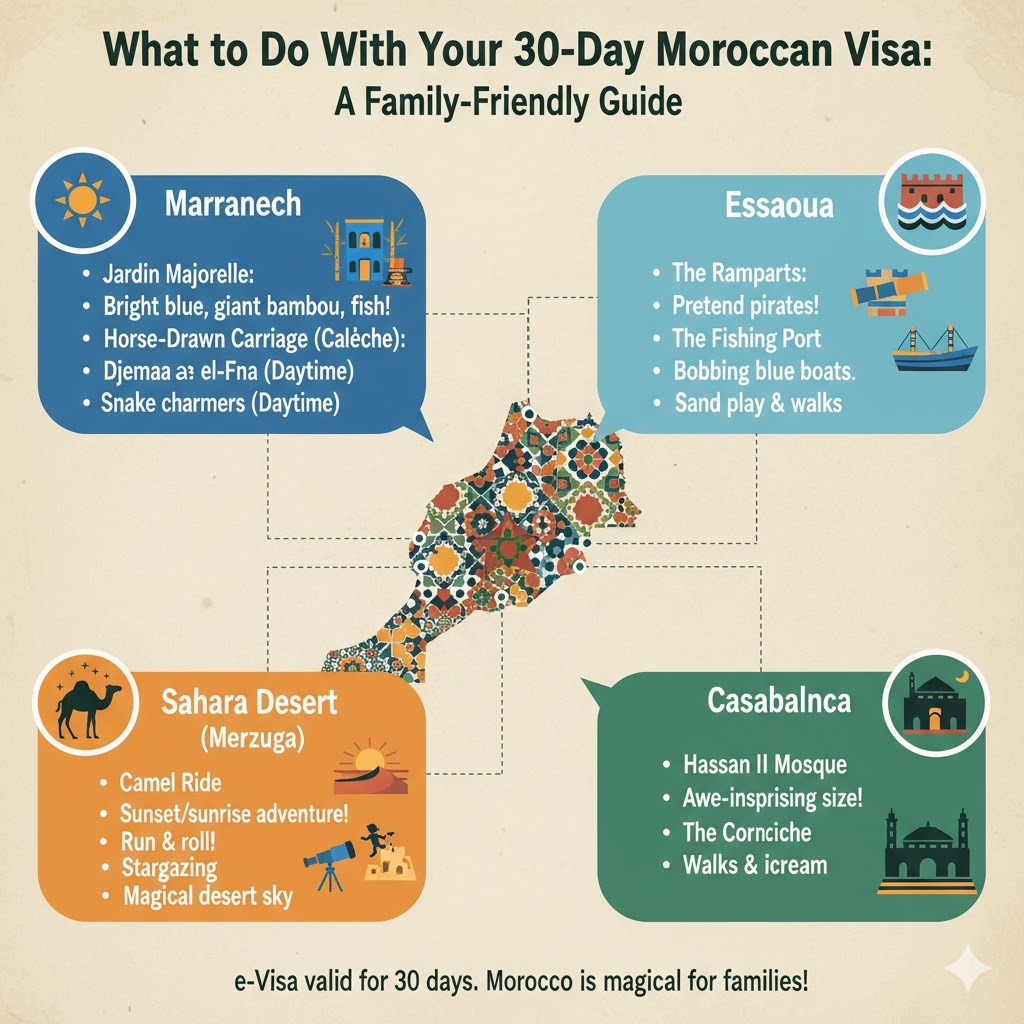
Marrakech:
Jardin Majorelle: Kids love the bright blue and yellow colors, the giant bamboo, and the fish ponds.
Horse-Drawn Carriage (Calèche): A fun, low-stress way to see the city walls and gardens.
Djemaa el-Fna in the Daytime: The evening square can be overwhelming, but during the day, kids are fascinated by the snake charmers (from a distance!) and orange juice stalls.
Essaouira (Coastal Town):
The Ramparts: Walk the old stone walls of the "Skala de la Ville," where kids can pretend to be pirates looking out at the sea.
The Fishing Port: See the bright blue fishing boats bobbing in the harbor.
The Beach: Great for walking and playing in the sand (though often too windy for swimming).
The Sahara Desert (Merzouga):
The Camel Ride: This is the #1 highlight for most families. A sunset or sunrise camel ride into the dunes is an unforgettable adventure.
Dune Climbing: Kids have endless energy for running up and rolling down the soft sand dunes.
Stargazing: Sleeping in a desert camp under a clear, starry sky is a magical experience.
Casablanca:
Hassan II Mosque: The sheer size is awe-inspiring for all ages.
The Corniche: A long seaside promenade perfect for a walk, getting ice cream, and watching the waves.
Do my children (minors) need their own e-Visas?
Yes, absolutely. Every individual traveler, regardless of age, must have their own separate e-Visa. You cannot "add" your child to your application.
You must complete a full, separate application for each child, using their passport.
What e-Visa type do I get for my child?
You will apply for a "Moroccan Tourist Visa" for your child, even if you are traveling on a "Business eVisa."
The most important part: your child must also be eligible under the "List B" rule. This means your child must also have a valid US/Schengen/UK visa or residence permit.
If your child has their own US tourist visa, you will use that as their "Supporting Document."
If your child is listed as a dependent on your Schengen residence permit, you can upload a scan of that permit as their "Supporting Document."
I am a single parent on a Business e-Visa. Can my child travel with me?
Yes, absolutely. This is a very common scenario. Here is the correct way to do it:
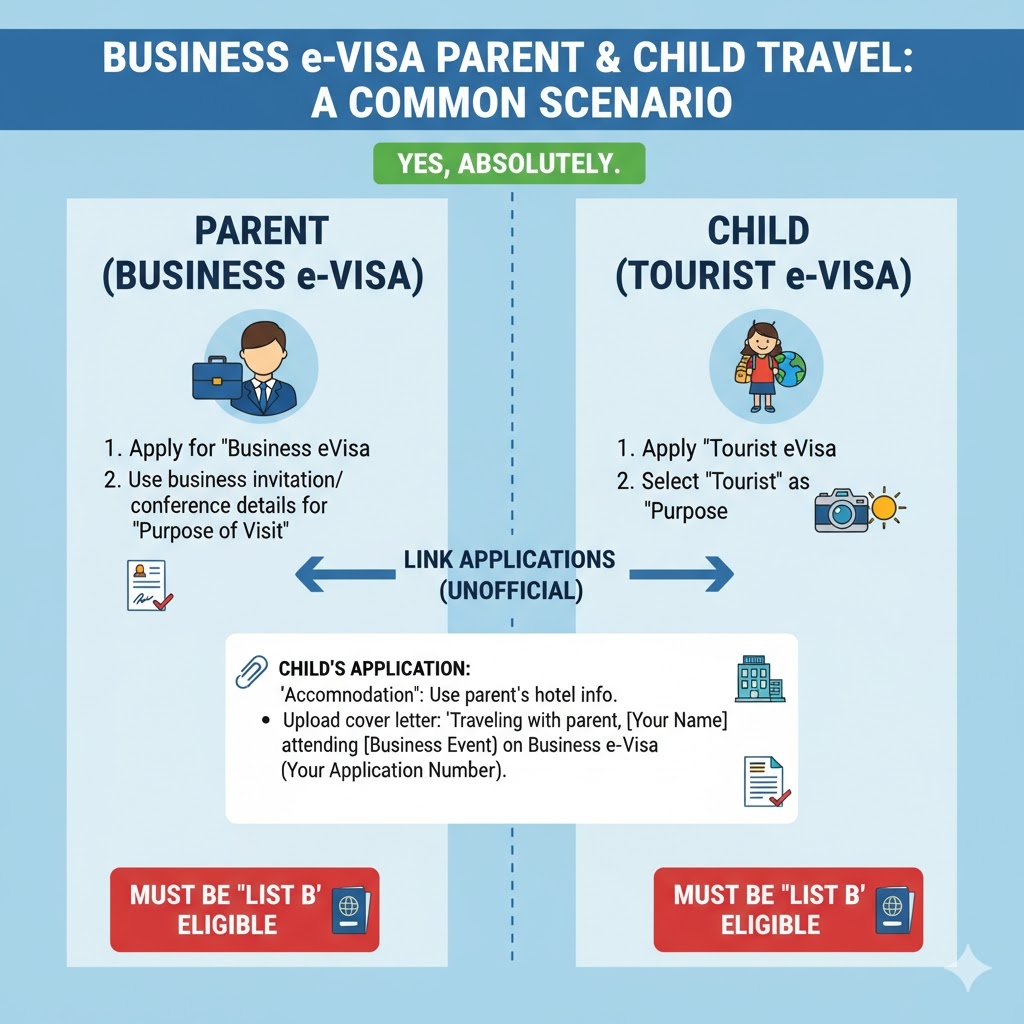
You Apply for a "Business eVisa": You will complete your application, using your business invitation or conference details as your "Purpose of Visit."
Your Child Applys for a "Tourist eVisa": You will complete a separate application for your child, selecting "Tourist" as the purpose.
Link the Applications (Unofficially): In your child's tourist application, for the "accommodation" section, you will use the same hotel information as your business trip. You can also upload a small cover letter with your child's passport scan explaining "Traveling with parent, [Your Name], who is attending [Business Event] on Business e-Visa [Your Application Number]." This is not mandatory but is very helpful for the visa officer.
Both Must Be Eligible: Remember, both you and your child must separately meet the "List B" eligibility rule (each having a valid supporting US/Schengen/etc. document).
What about transit? Do we need a visa to change planes in Casablanca?
This depends entirely on your flight booking:
NO Visa Needed (Airside Transit): If you are flying (for example) Kinshasa -> Casablanca -> Paris, and your bags are checked all the way through to Paris, AND you do not leave the international transit area of the airport, you do not need a Moroccan visa.
YES, Visa Needed (Landside Transit): You WILL need a valid e-Visa if you have to:
Collect your baggage in Casablanca and re-check it for your next flight.
Change terminals and must pass through passport control.
Leave the airport for any reason (e.g., a long layover).
The safest rule: Check with your airline (like Royal Air Maroc) before you fly. Ask them, "Will I need to pass through immigration in Casablanca?" If the answer is yes, you and your child both need e-Visas.
My payment failed but my card works! What's the problem?
This is the most common technical complaint. The Visa payment gateway can be sensitive to international cards.
It's Your Bank: The problem is almost always your local bank (e.g., Rawbank, Equity BCDC, etc.) blocking an unusual international transaction to Morocco.
Solution: Before you pay, call your bank's customer service. Tell them you are about to make an online payment to a Moroccan government website and ask them to pre-authorize it.
My valid US visa is in my old, expired passport. What should I do?
This is a very common and difficult problem. You must travel with both your old passport (containing the valid visa) and your new passport.
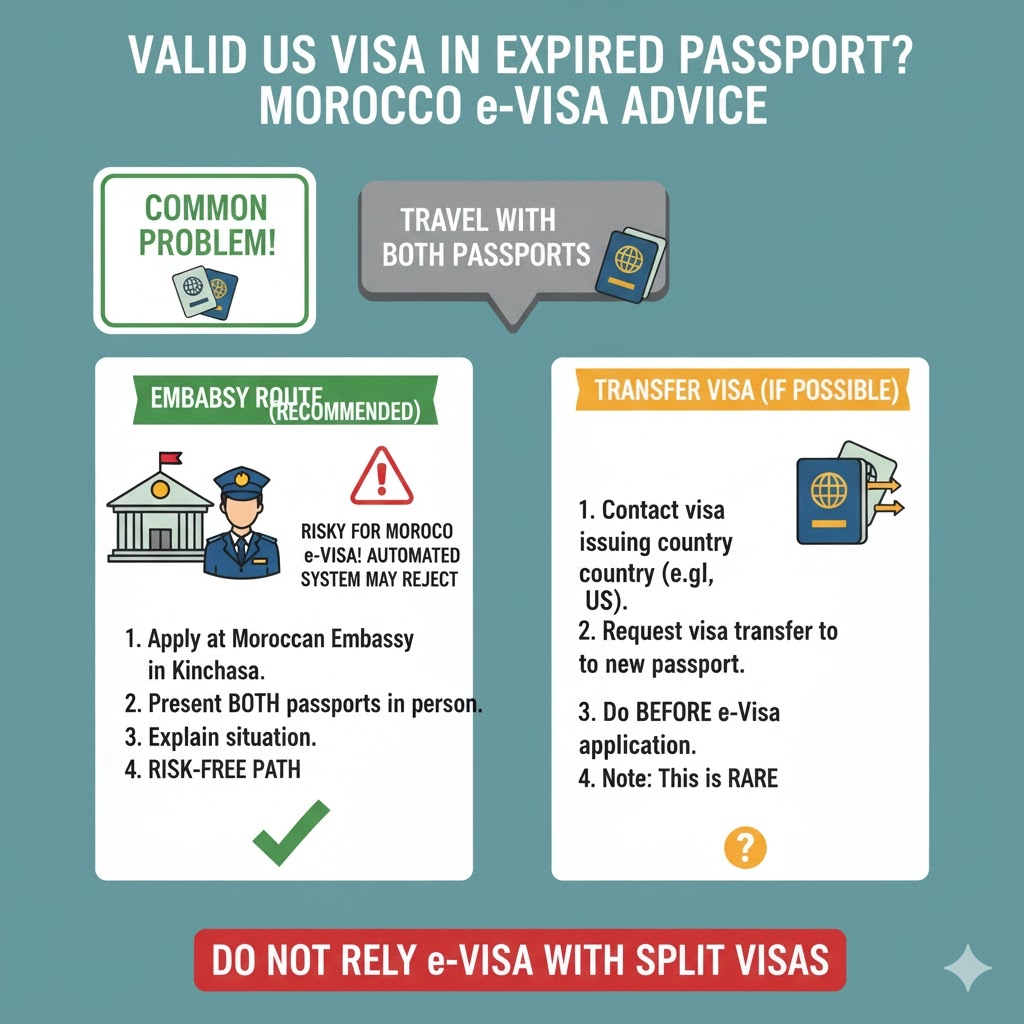
However, for the Morocco e-Visa application, this is risky. The automated system may not understand this. The safest options are:
The Embassy Route (Recommended): Apply at the Moroccan Embassy in Kinshasa. There, you can present both passports in person and explain the situation. This is the risk-free path.
Transfer Visa (if possible): See if the country that issued the visa (e.g., the US) will transfer it to your new passport before you apply for the e-Visa (though this is rare).
A Traveler's Guide: Using an eSIM in Morocco
Staying connected is essential, especially on a business trip or with family. An eSIM is a digital SIM card that you can install on your phone before you leave home. When you land in Morocco, you're instantly connected to data.
How to Get and Activate Your eSIM (The 4-Step Process)
Check Phone Compatibility: Make sure your phone is "unlocked" and supports eSIM (generally, iPhone 11 or newer, Samsung S20 or newer, Google Pixel 3 or newer).
Purchase Online: Before you leave the DRC, buy a Morocco-specific data plan from an online eSIM provider (like Airalo, Holafly, Ubigi, etc.).
Install the Profile: They will email you a QR code. Go to your phone's settings, tap "Add eSIM," and scan the code (do this while you have Wi-Fi).
Activate on Arrival: When your plane lands in Casablanca, turn on your new eSIM line and turn on "Data Roaming" for it. You'll be connected to a local network (like Maroc Telecom or Orange) immediately.
Common eSIM Problems & Troubleshooting
Here are the 4 most common issues users face:
Problem: "My phone is locked!"
Explanation: This is the #1 issue. If you got your phone on a contract from a carrier (like Vodacom, Orange, etc.), it might be "carrier-locked" so it can't be used with other networks.
Solution: You must call your home carrier before your trip and ask them to "network unlock" your device. eSIMs only work on unlocked phones.
Problem: "I installed it, but I have no data."
Explanation: Your settings are probably incorrect.
Solution: You must do two things: 1) Turn ON "Data Roaming" for your new eSIM line (this is required for it to connect). 2) Check the APN settings in your phone; your provider will tell you if you need to type a word (like "internet") into the APN field.
Problem: "I deleted my eSIM profile by accident!"
Explanation: Most eSIM QR codes are for a one-time installation only. If you delete the profile from your phone, you usually cannot re-install it.
Solution: Be very careful not to delete the eSIM. If you do, you must contact the eSIM provider's customer support (while on Wi-Fi) and ask them to issue a new QR code. This is a major hassle.
Problem: "I can't receive calls to my home (DRC) number."
Explanation: An eSIM for travel is often data-only. Or, you may have turned off your home SIM.
Solution: Modern phones can have both SIMs active. Keep your physical DRC SIM (or home eSIM) on for calls/texts, but set your new Moroccan eSIM as the default for "Mobile Data." This way, you can still receive important calls/texts while using cheap local data. (Just be aware, your home carrier may charge you roaming fees to answer those calls).
Arriving in Morocco: What to Show at the Border
Congratulations! Your e-Visa was approved, and you received the PDF. What now?
Print It: You must have a printed copy of your e-Visa. Do not rely on your phone. (Print one for your child, too).
Prepare Your Documents: When you approach the immigration officer, you must have three things in your hand (for each traveler):
Your DRC Passport
Your printed e-Visa document
The original "Supporting Document" that made you eligible (your US visa, French residence permit, etc.)
You must present all three. Be prepared to also show your hotel reservation and return flight ticket if asked.
